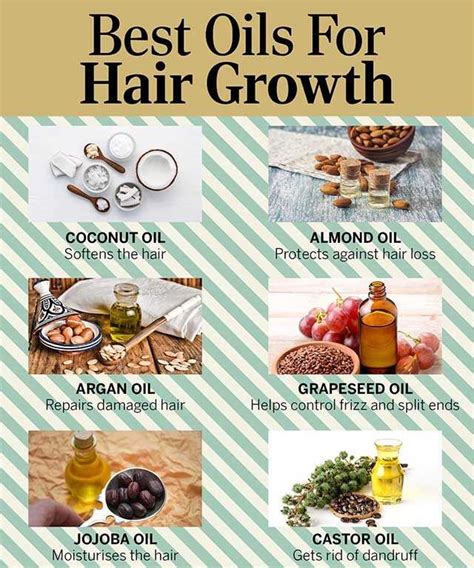Hair growth is a common concern for many people, as it can be affected by a variety of factors, including genetics, age, diet, and stress. While there are no miracle cures for hair loss, there are a number of natural oils that can help to promote hair growth and improve the overall health of your hair and scalp.

What oils are good for hair growth?
Here are some of the best oils for hair growth:
- Coconut oil: Coconut oil is a rich source of lauric acid, which has been shown to penetrate the hair shaft and help to prevent protein loss. This can help to reduce breakage and promote hair growth. Coconut oil is also a good moisturizer, which can help to keep your scalp and hair hydrated.
- Olive oil: Olive oil is another good source of fatty acids, which are essential for hair growth. Olive oil can help to nourish and condition your hair, making it softer and more manageable. It can also help to protect your hair from damage caused by heat styling and environmental stressors.
- Argan oil: Argan oil is a rich source of antioxidants, which can help to protect your hair from damage. It is also a good source of fatty acids, which can help to nourish and condition your hair. Argan oil can help to improve the appearance of dry, damaged hair and make it look healthier and more vibrant.
- Jojoba oil: Jojoba oil is very similar to the natural oils produced by your scalp. This makes it a good choice for people with all hair types, as it is unlikely to cause irritation or weigh your hair down. Jojoba oil can help to moisturize your scalp and hair, and it can also help to reduce dandruff.
- Avocado oil: Avocado oil is a rich source of vitamins A, D, and E, which are all essential for hair growth. Avocado oil can help to nourish and condition your hair, making it softer and more manageable. It can also help to protect your hair from damage caused by heat styling and environmental stressors.
- Rosemary oil: Rosemary oil is a stimulating oil that can help to promote hair growth. It is also a good source of antioxidants, which can help to protect your hair from damage. Rosemary oil can be used as a scalp treatment or added to your shampoo or conditioner.
- Lavender oil: Lavender oil is a calming oil that can help to reduce stress and promote relaxation. It is also a good source of antioxidants, which can help to protect your hair from damage. Lavender oil can be used as a scalp treatment or added to your shampoo or conditioner.
- Peppermint oil: Peppermint oil is a stimulating oil that can help to promote hair growth. It is also a good source of antioxidants, which can help to protect your hair from damage. Peppermint oil can be used as a scalp treatment or added to your shampoo or conditioner.
- Tea tree oil: Tea tree oil is an antifungal and antibacterial oil that can help to treat scalp conditions that can lead to hair loss. It is also a good source of antioxidants, which can help to protect your hair from damage. Tea tree oil can be used as a scalp treatment or added to your shampoo or conditioner.
- Clary sage oil: Clary sage oil is a hormonal balancing oil that can help to regulate the production of sebum. This can help to reduce scalp inflammation and promote hair growth. Clary sage oil can be used as a scalp treatment or added to your shampoo or conditioner.
How to use oils for hair growth
There are a few different ways to use oils for hair growth. You can apply them directly to your scalp, add them to your shampoo or conditioner, or use them as a hot oil treatment.
To apply oils directly to your scalp:
- Massage a few drops of oil into your scalp, using your fingertips.
- Cover your hair with a shower cap and leave it on for at least 30 minutes.
- Shampoo and condition your hair as usual.
To add oils to your shampoo or conditioner:
- Add a few drops of oil to your shampoo or conditioner.
- Mix well and apply to your hair as usual.
- Rinse your hair thoroughly.
To use oils as a hot oil treatment:
- Warm a few tablespoons of oil in the microwave or on the stovetop.
- Massage the warm oil into your scalp and hair.
- Cover your hair with a shower cap and leave it on for at least 30 minutes.
- Shampoo and condition your hair as usual.
You can use oils for hair growth as often as you like. However, it is important to start slowly to avoid scalp irritation. If you experience any irritation, discontinue use and consult with a dermatologist.
Tips for getting the most out of oils for hair growth
- Choose the right oil for your hair type and scalp condition.
- Use oils regularly to see the best results.
- Be patient, as it can take time to see results.
- Combine oils with other hair growth treatments, such as scalp massages and hair masks.
Conclusion
There are a number of natural oils that can help to promote hair growth and improve the overall health of your hair and scalp. By using oils regularly, you can improve the appearance of your hair and make it healthier and more manageable.
| Oil | Benefits |
|---|---|
| Coconut oil | Penetrates the hair shaft to prevent protein loss, moisturizes the scalp and hair |
| Olive oil | Nourishes and conditions the hair, protects from heat and environmental damage |
| Argan oil | Rich in antioxidants to protect hair from damage, nourishes and conditions, improves appearance |
| Jojoba oil | Similar to natural scalp oils, suitable for all hair types, moisturizes scalp and reduces dandruff |
| Avocado oil | Rich in vitamins A, D, and E, nourishes and conditions hair, protects from damage |
| Rosemary oil | Stimulates hair growth, rich in antioxidants, can be used as scalp treatment or added to shampoo/conditioner |
| Lavender oil | Calms and reduces stress, rich in antioxidants, can be used as scalp treatment or added to shampoo/conditioner |
| Peppermint oil | Stimulates hair growth, rich in antioxidants, can be used as scalp treatment or added to shampoo/conditioner |
| Tea tree oil | Antifungal and antibacterial, treats scalp conditions that lead to hair loss, rich in antioxidants |
| Clary sage oil | Balances hormones to regulate sebum production, reduces scalp inflammation, promotes hair growth |
| Method | Steps |
|---|---|
| Direct application | Massage oil into scalp, cover hair with shower cap for 30 minutes, shampoo and condition |
| Add to shampoo/conditioner | Add a few drops to shampoo or conditioner, mix well, apply to hair and rinse |
| Hot oil treatment | Warm oil, massage into scalp and hair, cover with shower cap for 30 minutes, shampoo and condition |
| Tip | Why |
|---|---|
| Choose the right oil | Oils have different benefits and are suitable for different hair types |
| Use oils regularly | Consistency is key for seeing results |
| Be patient | It may take time to see noticeable improvements |
| Combine with other treatments | Enhance results by using oils in conjunction with other hair growth methods |
| Oil | Advantages | Disadvantages |
|---|---|---|
| Coconut oil | Inexpensive, deeply penetrating, versatile | Can be heavy on fine hair |
| Olive oil | Nourishing, rich in antioxidants, good for dry hair | Can be greasy for some people |
| Argan oil | Rich in nutrients, improves hair health, protects from damage | Expensive, can be heavy |
| Jojoba oil | Similar to natural scalp oils, lightweight, non-irritating | Can be less effective than other oils |
| Avocado oil | Rich in vitamins and minerals, moisturizing, protective | Can be greasy for fine hair |
| Rosemary oil | Stimulating, promotes hair growth, refreshing | Can be irritating for some people |
| Lavender oil | Calming, promotes relaxation, reduces stress | Can be less effective than other oils |
| Peppermint oil | Stimulating, refreshing, promotes hair growth | Can be irritating for some people |
| Tea tree oil | Antifungal, antibacterial, treats scalp issues | Can be drying for some people |
| Clary sage oil | Balances hormones, reduces scalp inflammation, promotes hair growth | Can be less effective than other oils |
